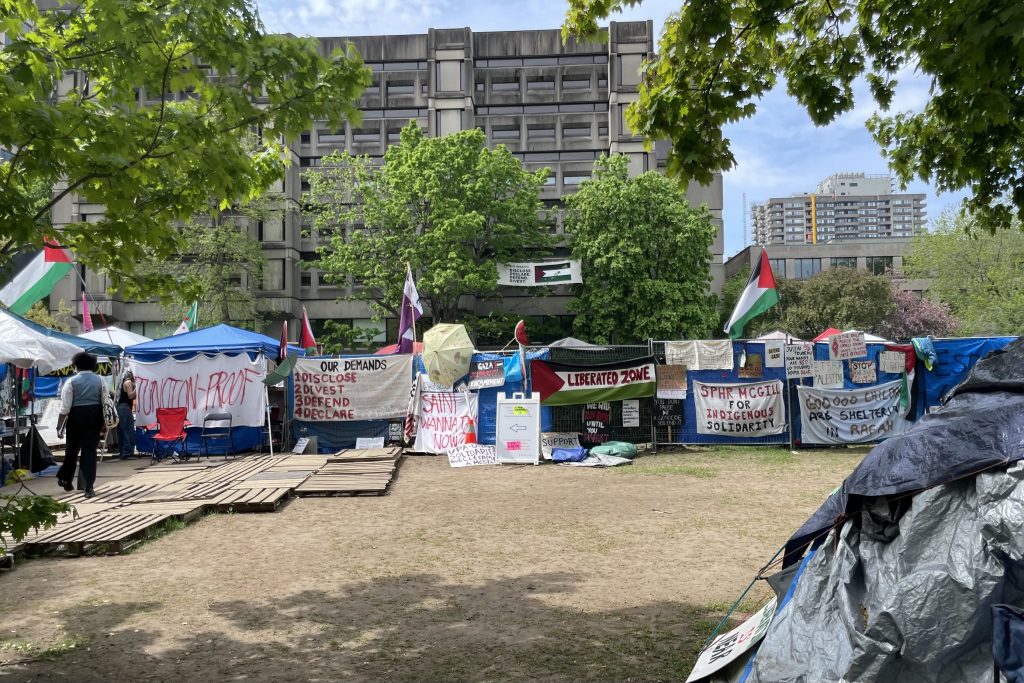80,000 Quebec nurses and more on strike, two days added
Posted November 8, 2023 8:38 am.
Last Updated November 8, 2023 6:37 pm.
Quebec health workers announced two more strike days, Nov. 23 and 24.
This comes as they begin their first of two strike days on Wednesday, their first in almost 25 years.
“As we are on the picket line right now, it is not moving. So we have to announce other strike days so he gets the message that we are serious,” says, Ann Dery, vice president nurse clinician in charge of negotiations in assistant labour relations for the McGill University Health Centre’s (MUHC) professional union.
“We are asking for close to 24 per cent of salary raise,” Dery says.
Naveed Hussain, a nurse at the Montreal General hospital added, “We’re just trying to provide for our families, provide for our rent, and just pay our rent and pay our mortgages, and keep up with the standard of living.”
“We’re looking at a huge crisis right now, and we’re looking towards our government, we need better faith negotiations so that we can come to the table, come to an agreement, and protect the future of nursing,” he added.

The union rejected the government’s Oct. 29 offer of a salary increase of 10.3 per cent over five years, a one-time payment of $1,000 to each worker in the first year of the contract and more money for shift workers like nurses, who work nights and weekends.
The Fédération interprofessionnelle de la santé (FIQ) represents 80,000 nurses, nursing assistants, respiratory therapists and clinical perfusionists in Quebec.
#WATCH: “If we have better working conditions, it’s better for the patients,” says nurse clinician at the Montreal General Hospital, Kelly Chavez. She’s among the 80,000 healthcare professionals on strike Wednesday and Thursday.
READ: https://t.co/XeUR2MjUHB pic.twitter.com/DVhhPINggs
— CityNews Montreal (@CityNewsMTL) November 8, 2023
FIQ president, Julie Bouchard, announced these next two days of strike, while visiting members on the picket line at a Quebec City health care facility.
She said that the FIQ negotiating committee was going to be back at the bargaining table to try to move this forward, which has been going on for several months.



The group’s collective agreements expired on March 31.
“It’s vital that we make progress at the table. We’re not going on strike out of the goodness of our hearts; it’s because our limits have been reached for too long. It’s a way of making ourselves heard by a contemptuous government that doesn’t understand our reality,” explains Bouchard, in a press release.
Montreal General Hospital nurse clinician, Kelly Chavez, was one of many healthcare workers who were proud to be on the picket lines. “They want to be able to displace nurses and doctors and healthcare professionals to any unit, to any other shift, to any other location that are in need, but as we all know, the cost of life is increasing, and that doesn’t show within our salaries,” she says.
Chavez added, “We’re not only here for salary […] we’re actually here to improve patient safety, patient care, so that we can have better working conditions.”
In addition to salaries, the FIQ is demanding a law on safe nurse-to-patient ratios, as well as more job stability.
#WATCH: The picket line outside the Jewish General Hospital in Montreal on the first day of a series of planned strikes of healthcare professionals across Quebec. It’s a pressure tactic amid contract negotiations with the government.
READ: https://t.co/XeUR2MjUHB pic.twitter.com/WFhPQQyJZY
— CityNews Montreal (@CityNewsMTL) November 8, 2023
“We’ve reached a breaking point in the healthcare network, and the government wants to further degrade working conditions. Our message to them today is that if they continue to ignore the health of the public network, they will find us all in their path. Our working conditions are the healthcare conditions of all Quebecers.”
Chavez hopes the government will remember that during the pandemic “they were calling us their angels, and all of a sudden the pandemic is not as important to them, and we became not as important to them.
“We need to fight to have this contract signed,” she says.
Amid the strikes, some care may be slowed down on certain units, but essential services will be maintained.
On Glen Calvin’s most recent outpatient visit to the Montreal General hospital, things went smoothly.
“I was in and out right away, didn’t have to wait too long […] They work so hard, especially with all the COVID and stuff they’ve been going through for the last years. They’re burned out, they really need all the support we can give them,” he says.
For Dery, more strike action is necessary.
“We are out for our first day, but we will stay out until we get an offer that is decent and that recognizes our specialty.”
—This report by The Canadian Press was first published in French and translated by CityNews



